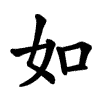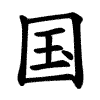Definify.com
Definition 2026
有
有
Translingual
| Stroke order | |||
|---|---|---|---|

| |||
| Japanese stroke order | |||
|---|---|---|---|
| | |||
Han character
有 (radical 74 月+2, 6 strokes, cangjie input 大月 (KB), four-corner 40227, composition ⿱𠂇月)
References
- KangXi: page 504, character 20
- Dai Kanwa Jiten: character 14332
- Dae Jaweon: page 880, character 2
- Hanyu Da Zidian: volume 3, page 2041, character 5
- Unihan data for U+6709
Chinese
|
simp. and trad. |
有 | |
|---|---|---|
Glyph origin
| Historical forms of the character 有
| |||
|---|---|---|---|
| Oracle bone script | Bronze inscriptions | Large seal script | Small seal script |
 |
 |
 |
 |
| Characters in the same phonetic series (又) (Zhengzhang, 2003) | |
|---|---|
| Old Chinese | |
| 絠 | *kɯːʔ |
| 醢 | *qʰɯːʔ |
| 珛 | *qʰʷɯs |
| 栯 | *ɢʷɯʔ, *qʷɯ |
| 有 | *ɢʷɯʔ |
| 友 | *ɢʷɯʔ |
| 右 | *ɢʷɯʔ, *ɢʷɯs |
| 宥 | *ɢʷɯs |
| 囿 | *ɢʷɯs, *ɡʷɯ |
| 侑 | *ɢʷɯs |
| 酭 | *ɢʷɯs |
| 姷 | *ɢʷɯs |
| 又 | *ɢʷɯs |
| 佑 | *ɢʷɯs |
| 祐 | *ɢʷɯs |
| 賄 | *qʰʷɯːʔ |
| 蛕 | *qʰʷɯːʔ, *ɡʷɯː |
| 烠 | *ɡʷɯː |
| 倄 | *ɢraːw, *ɢʷɯːʔ |
| 鮪 | *ɢʷɯʔ |
| 洧 | *ɢʷɯʔ |
| 痏 | *ɢʷɯʔ |
| 郁 | *qʷɯ |
| 戫 | *qʷɯ |
| 哊 | *ɡʷɯ |
Phono-semantic compound (形聲, OC *ɢʷɯʔ) : phonetic 又 (OC *ɢʷɯs, “hand”) + semantic ⺼ (“meat”) – a hand holding meat, hence “in possession of”. 又 is both a phonetic and semantic component. The hand shape has been significantly abstracted; compare 右 (OC *ɢʷɯʔ, *ɢʷɯs).
Alternatively, the graph was perhaps originally intended for the word 醢 (OC *qʰɯːʔ, “minced pickled meat”), which also has the 又 (OC *ɢʷɯs) element as phonetic.
Shuowen Jiezi and other ancient sources have erroneously analyzed the character as a phono-semantic compound (形聲, OC *ɢʷɯʔ) : phonetic 又 (OC *ɢʷɯs) + semantic 月 (“moon”). Shuowen Jiezi defines 有 as "不宜有也" ("[to have something that] not should be had"), citing the Spring and Autumn Annals (春秋傳): "日月有食之" ("There are solar and lunar eclipses"). As eclipses were not auspicious to the Chinese, they were "something that should not be happening". The 月 component alludes to the inauspicious lunar eclipse.
Etymology
Possibly Sino-Tibetan. Compare Tibetan ཡོད་པ (yod pa, “to be; to have”). Related to:
- 侑 (OC *ɢʷɯs, “to offer, to sacrifice”) [causative, i.e. “to cause to have”]
- 又 (OC *ɢʷɯs, “again”) [adverbial]
- 或 (OC *ɡʷɯːɡ, “some; or”) [indefinite]
Pronunciation 1
- Mandarin
- Cantonese (Jyutping): jau5
- Hakka (Sixian, PFS): yû
- Min Dong (BUC): ô / īu
- Min Nan
- Wu (Wiktionary): hhieu (T3)
- Mandarin
- (Standard Chinese, Beijing)+
- Pinyin:
- Zhuyin: ㄧㄡˇ
- Wade-Giles: yu3
- Gwoyeu Romatzyh: yeou
- IPA (key): /i̯oʊ̯²¹⁴/
-

- (Standard Chinese, Beijing)+
- Cantonese
- (Standard Cantonese, Guangzhou)+
- Jyutping: jau5
- Yale: yáuh
- Cantonese Pinyin: jau5
- IPA (key): /jɐu̯¹³/
- (Standard Cantonese, Guangzhou)+
- Hakka
- (Northern Sixian, incl. Miaoli)
- Pha̍k-fa-sṳ: yû
- Hakka Romanization System: iu´
- Hagfa Pinyim: yiu1
- IPA: /i̯u²⁴/
- (Southern Sixian, incl. Meinong)
- Pha̍k-fa-sṳ: yû
- Hakka Romanization System: (r)iu´
- Hagfa Pinyim: yiu1
- IPA: /(j)i̯u²⁴/
- (Northern Sixian, incl. Miaoli)
- Min Dong
- (Fuzhou)
- Bàng-uâ-cê: ô / īu
- IPA (key): /ou²⁴²/, /ieu³³/
- Note: ô - vernacular; īu - literary.
- (Fuzhou)
- Min Nan
- (Hokkien: mainstream Taiwanese, Xiamen, Zhangzhou)
- Pe̍h-ōe-jī: ū
- Tâi-lô: ū
- Phofsit Daibuun: u
- IPA (Taipei): /u³³/
- IPA (Kaohsiung): /u³³/
- IPA (Xiamen): /u²²/
- IPA (Zhangzhou): /u²²/
- (Hokkien: Quanzhou)
- Pe̍h-ōe-jī: ǔ
- Tâi-lô: ǔ
- IPA (Quanzhou): /u²²/
- (Hokkien: Xiamen, Quanzhou, Zhangzhou, mainstream Taiwanese)
- Pe̍h-ōe-jī: iú
- Tâi-lô: iú
- Phofsit Daibuun: iuo
- IPA (Xiamen): /iu⁵³/
- IPA (Quanzhou): /iu⁵⁵⁴/
- IPA (Zhangzhou): /iu⁵³/
- IPA (Taipei): /iu⁵³/
- IPA (Kaohsiung): /iu⁴¹/
- Note: ū/ǔ - vernacular; iú - literary.
- (Teochew)
- Peng'im: u6
- Pe̍h-ōe-jī-like: ŭ
- IPA (key): /u³⁵/
- (Hokkien: mainstream Taiwanese, Xiamen, Zhangzhou)
- Wu
- (Shanghainese)
- Wiktionary: hhieu (T3)
- IPA (key): /ɦiɜ²³/
- (Shanghainese)
| Rime | |
|---|---|
| Character | 有 |
| Reading # | 1/1 |
| Initial (聲) | 云 (35) |
| Final (韻) | 尤 (136) |
| Tone (調) | Rising (X) |
| Openness (開合) | Open |
| Division (等) | III |
| Fanqie | 云久切 |
| Reconstructions | |
| Zhengzhang Shangfang |
/ɦɨuX/ |
| Pan Wuyun |
/ɦiuX/ |
| Shao Rongfen |
/ɣiəuX/ |
| Edwin Pulleyblank |
/ɦuwX/ |
| Li Rong |
/ɣiuX/ |
| Wang Li |
/ɣĭəuX/ |
| Bernard Karlgren |
/i̯ə̯uX/ |
| Expected Mandarin Reflex |
yǒu |
| Baxter-Sagart system 1.1 (2014) | |
|---|---|
| Character | 有 |
| Reading # | 1/1 |
| Modern Beijing (Pinyin) |
yǒu |
| Middle Chinese |
‹ hjuwX › |
| Old Chinese |
/*[ɢ]ʷəʔ/ |
| English | have, exist |
Notes for Old Chinese notations in the Baxter-Sagart system: * Parentheses "()" indicate uncertain presence; | |
| Zhengzhang system (2003) | |
|---|---|
| Character | 有 |
| Reading # | 1/1 |
| No. | 15595 |
| Phonetic component |
又 |
| Rime group |
之 |
| Rime subdivision |
0 |
| Corresponding MC rime |
有 |
| Old Chinese |
/*ɢʷɯʔ/ |
Definitions
有
- to have; to possess (when a subject is present)
- there is; to exist (when a subject is absent)
- (euphemistic) to be pregnant with a child
- abundant; affluent
- many; much; (of time) long; (of age) old
- some (indefinite pronoun)
- A surname.
Usage notes
Compounds
|
|
|
Pronunciation 2
- Mandarin
- (Standard Chinese, Beijing)+
- Pinyin:
- Zhuyin: ㄧㄡˋ
- Wade-Giles: yu4
- Gwoyeu Romatzyh: yow
- IPA (key): /i̯oʊ̯⁵¹/
-

- (Standard Chinese, Beijing)+
- Cantonese
- (Standard Cantonese, Guangzhou)+
- Jyutping: jau6
- Yale: yauh
- Cantonese Pinyin: jau6
- IPA (key): /jɐu̯²²/
- (Standard Cantonese, Guangzhou)+
Definitions
有
- †Alternative form of 又 (yòu, “again”).
- †Alternative form of 又 (yòu, “and; with a remainder of (when dividing an integer by ten)”).
-
- 吾十有五而志於學,三十而立。 [Classical Chinese, trad.]
- 吾十有五而志于学,三十而立。 [Classical Chinese, simp.]
- From: c. 479 BCE – 221 BCE, Analects of Confucius (論語.為政)
- Wú shí yòu wǔ ér zhì yú xué, sānshí ér lì. [Pinyin]
- When I was 10 and 5 years (15 years old), I devoted myself to study. At the age of 30, I established myself (got a job and started a family).
-
Japanese
| Japanese stroke order | |||
|---|---|---|---|

| |||
Kanji
- exist
- get to exist; appear
- keep; maintain
- existence; belonging
- someone did certain thing
- possess
- have
- happen
- occur
- approximately
Readings
- Goon: う (u)
- Kan’on: ゆう (yū)
- Kun: ある (aru), もつ (motsu), たもつ (tamotsu)
- Nanori: あり (ari), すみ (sumi), たもつ (tamotsu), とお (tō), とも (tomo), なお (nao), なり (nari), みち (michi), もち (mochi), り (ri)
Compounds
Derived terms
- 有る (aru)
Proper noun
- A female given name